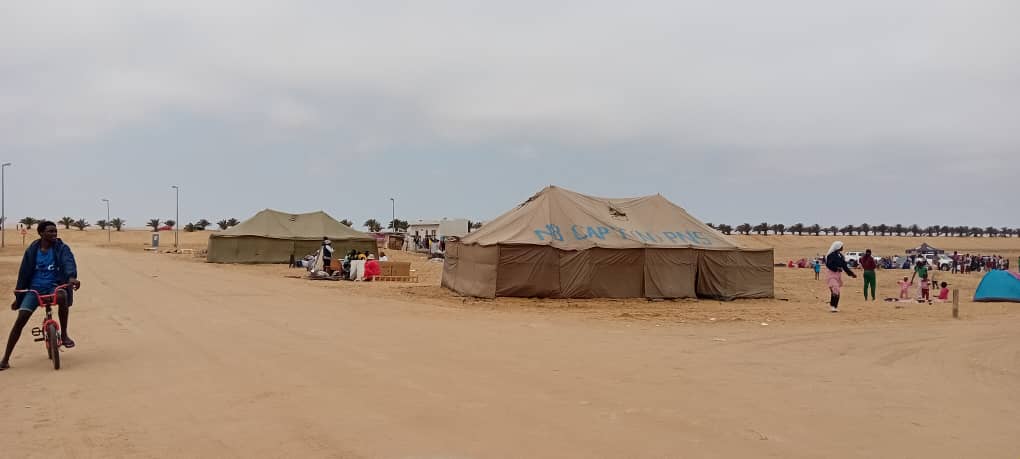DISCUSSIONS on whether Government’s Affirmative Action Loan Scheme should be revised continued in the National Assembly last week with Swapo MP Kaire Mbuende expressing reservations about its achievements.
While praising the scheme for aiding the process of transferring land to landless black Namibians, Mbuende said he did not think the scheme had assisted in increasing productivity and alleviating poverty. He said recommendations made by a parliamentary standing committee for improving the scheme had failed to indicate how the scheme could transform the agricultural sector.”The AALS has not done very well in terms of increasing productivity and contributing to agriculture’s contribution to the GDP,” said Mbuende.The former Foreign Affairs Deputy Minister also expressed the view that Government needed to do more to develop new farms.He said the estimated 4 000 commercial farms in Namibia had originally been virgin land which had needed to be developed into what they had become today.Mbuende said Government should rather develop new farms and in so doing provide more land for resettlement purposes instead of paying for developed farms.But Lands Minister Hifikepunye Pohamba said it was difficult to resettle people in areas where they did not want to live.He said ancestral ties were an obstacle to his Ministry’s attempts to resettle people.In turn, Mbuende contended that it was beyond Government policy to oblige people with a choice of where they wanted to be resettled, and that its responsibility was primarily to transfer land to the landless.Mbuende also raised the issue of ownership of land in communal areas.He argued that farmers should be given title deeds so that they could use this as collateral.But Pohamba said he had reservations about relaxing several of the financial requirements of the scheme as recommended in the parliamentary committee’s report, saying it could contribute to the downfall of AgriBank.He said a balance had to be struck between assisting emerging farmers and ensuring the bank’s financial viability.Pohamba said Government should look into the high interest rates charged and the repayment duration of loans.However, Government had to be more cautious in exempting AALS beneficiaries from land tax, noting that some of them were well-off.Pohamba suggested that exemptions be determined individually and that the financially strong should pay land tax within the first year of taking over a farm.Others, he said, could be exempt for a maximum period of seven years.Minister of Agriculture, Water and Rural Development Helmut Angula echoed Pohamba’s concerns.Angula said he was not opposed to revising the loan conditions but that any changes had to be within the means of Government.He said he did not agree with a suggestion of removing the 10-year restriction clause on reselling the land, saying it was meant to curb speculation.Angula added that the AALS could not be extended to include agricultural farmers and that Government’s ‘Green Scheme’ would make provision for assisting emerging farmers.He said recommendations made by a parliamentary standing committee for improving the scheme had failed to indicate how the scheme could transform the agricultural sector.”The AALS has not done very well in terms of increasing productivity and contributing to agriculture’s contribution to the GDP,” said Mbuende.The former Foreign Affairs Deputy Minister also expressed the view that Government needed to do more to develop new farms.He said the estimated 4 000 commercial farms in Namibia had originally been virgin land which had needed to be developed into what they had become today.Mbuende said Government should rather develop new farms and in so doing provide more land for resettlement purposes instead of paying for developed farms.But Lands Minister Hifikepunye Pohamba said it was difficult to resettle people in areas where they did not want to live.He said ancestral ties were an obstacle to his Ministry’s attempts to resettle people.In turn, Mbuende contended that it was beyond Government policy to oblige people with a choice of where they wanted to be resettled, and that its responsibility was primarily to transfer land to the landless.Mbuende also raised the issue of ownership of land in communal areas.He argued that farmers should be given title deeds so that they could use this as collateral.But Pohamba said he had reservations about relaxing several of the financial requirements of the scheme as recommended in the parliamentary committee’s report, saying it could contribute to the downfall of AgriBank.He said a balance had to be struck between assisting emerging farmers and ensuring the bank’s financial viability.Pohamba said Government should look into the high interest rates charged and the repayment duration of loans.However, Government had to be more cautious in exempting AALS beneficiaries from land tax, noting that some of them were well-off.Pohamba suggested that exemptions be determined individually and that the financially strong should pay land tax within the first year of taking over a farm.Others, he said, could be exempt for a maximum period of seven years.Minister of Agriculture, Water and Rural Development Helmut Angula echoed Pohamba’s concerns.Angula said he was not opposed to revising the loan conditions but that any changes had to be within the means of Government.He said he did not agree with a suggestion of removing the 10-year restriction clause on reselling the land, saying it was meant to curb speculation.Angula added that the AALS could not be extended to include agricultural farmers and that Government’s ‘Green Scheme’ would make provision for assisting emerging farmers.
Stay informed with The Namibian – your source for credible journalism. Get in-depth reporting and opinions for
only N$85 a month. Invest in journalism, invest in democracy –
Subscribe Now!










